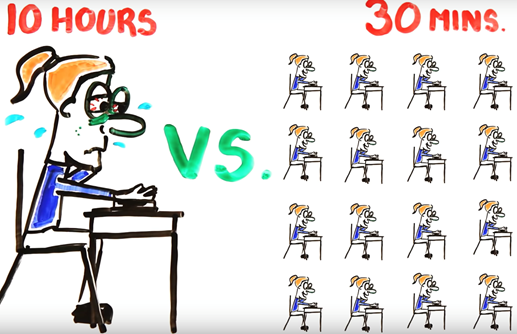Junior college can be one of the toughest rides of one’s academic journey and this is a well-known fact among anyone who knows and is part of the Singapore education system. It is such a steep hill to climb when students move on from O levels to A levels because the depth and content of subjects increase to a great extent and rigour is so much more aggressive, which leaves students feeling lost and helpless. Everyone is unique in their learning style, the pace of learning, method of processing information, and the way of studying as well. Hence, no matter how much students verbally seek advice from their seniors who have completed A levels, their answer is going to be “There is no one way to do it; do what works for you”. This generic advice leaves students even more confused and unsure about what they have to do.

Source: neatoday.org
So, in order to clear your confusion, here are some general tips to survive through Junior college. These techniques may not suit everyone, but you can modify them or stick to the ones that are the most effective for you.
#TIP 1: EFFECTIVE STUDY SESSIONS

Source: You tube
Your brain has limits and you need to treat it right. Though you may have the willpower to convince yourself that you will be able to pull an all-nighter to finish studying a few chapters, the next morning when you try to recall what you’ve studied, you will realize that you never progressed; your back to square one. The technique is to be calculative in the way you break down your study session and plan what to do in each study session.
Short repeated sessions enable you to internalise information effectively and you will have clarity as to what you are studying about. Switching subjects for every study session will keep you refreshed and it doesn’t cause your mind to become exhausted. Continuous work for your brain will cause it to tire out easily and you will not have essentially wasted so much of that time because you would have barely internalised any information.
Break that 10 hours down into many 30-minute sessions and see for yourself that it works magic!
#TIP 2: KEEP UP; DON’T PROCRASTINATE
We often catch ourselves saying, “Oh, I’ll do this later; I have lots of time”. This attitude is common, but detrimental for any Junior college student in Singapore. Though you may have a tight schedule of completing tutorials and worksheets, you need to learn how to never brush away revision work and leave it aside to deal with later. You need to be able to manage your time smartly which allows you to complete tutorials (you obviously won’t be able to solve all the questions perfectly, so don’t waste your time being stuck on one question), revise your lecture notes and read up in advance for future lectures as well.

Moreover, Watching your tutor work out the solution or explain a concept is never enough because when someone else is doing all the work, everything seems easy but it becomes truly challenging when you try it all by yourself. When you are being given lecture notes, you could possibly condense the notes for yourself and write out in a way you understand, after every lecture session or tutorial.
#TIP 3: PRACTICE WITH A PURPOSE
Don’t be all brawn and no brains; it’s not about studying hard, instead, it’s all about studying smart. You need to keep in mind that just blindly completing piles of mock test papers will never get you anywhere. With each practice, you need to feel yourself improving and see the change in yourself. Do not fear to solve challenging questions because if you avoid them, that ‘easy-way-out’ will haunt you once again during exams. Step out of your comfort zone give it a try. If you stop learning, you’re standing at one place. If you do not choose to help yourself, no one will come forth to guide you as well.
When you are stuck on a problem during your practice, watch online videos and look at how similar problems are being tackled or you could even contact your tutor to ask for guidance. When you have information which is readily available and easily accessible, you should make use of it instead of complaining about how tough education is.
#TIP 4: TUITION
Tuition teachers are the catalyst to students’ academic progress and success. With home tuition, its one-to-one, unlike a classroom environment which creates a plethora of opportunities for distractions. Smaller student to teacher ratio is one of the biggest advantages that private learning offers.
The study materials given in schools are usually restricted to what the syllabuses demand and do not provide information or insights beyond the syllabus. Sometimes an extra explanation is essential to look at the bigger picture and to also comprehend certain sub-concepts in an abstract and complex topic. This is the reason why home tuition in Singapore also has free test papers to train students as well.
#TIP 5: NOTHING IS THE MAKE OR BREAK
One can manage his success, but it is how he manages his failures that truly matters. The former president of India, Dr. A.P.J. Abdul Kalam has always talked about how man has to learn how to deal with his fears and failures smartly in order to succeed.

Source: Jumpic
Students make the mistake of exaggerating their failures and this essentially does not bring you anywhere close to success. A failure in an exam does not dictate the outcomes of future tests or exams. One failed test paper is mutually exclusive to the outcomes of future exams. Nothing is permanent and things will change if you have put in the effort and remain persistent. Be less emotional and take practical steps to take control of your grades.
BOTTOM LINE
It will be a tough ride and you need to stay motivated till the end to see yourself succeed. Follow the tips and strategies you think works for you and work hard to push yourself till the very end.
